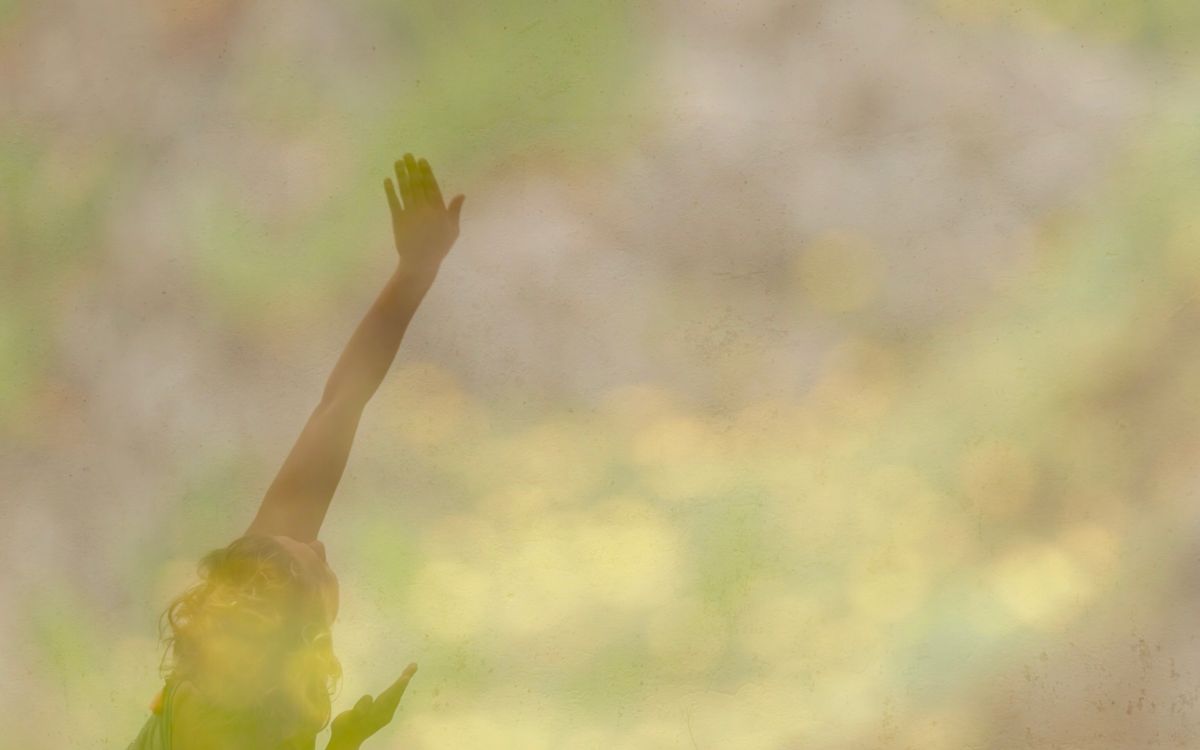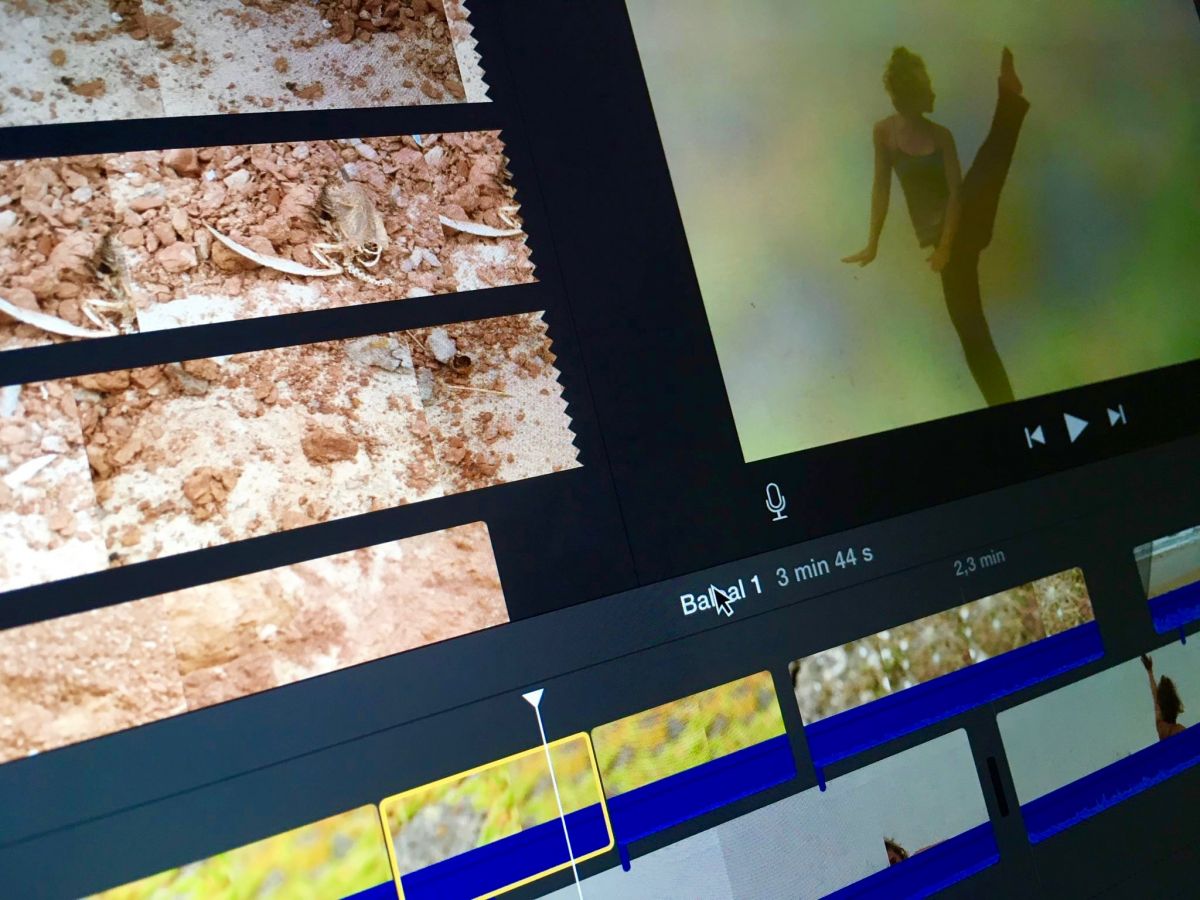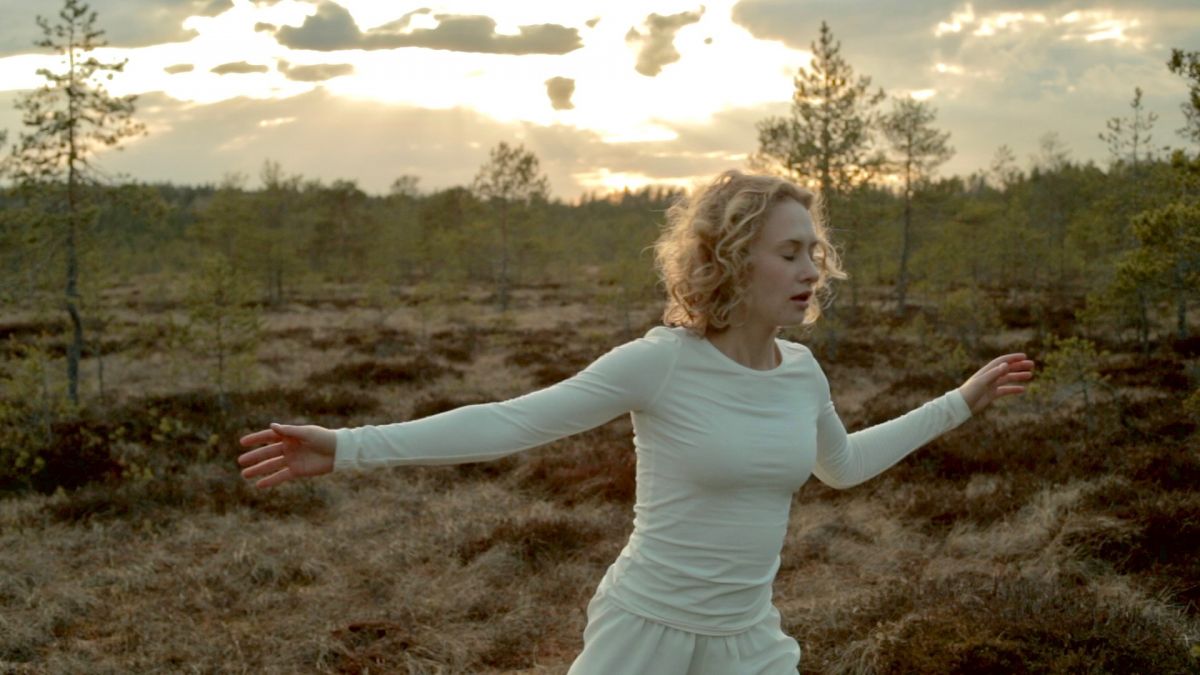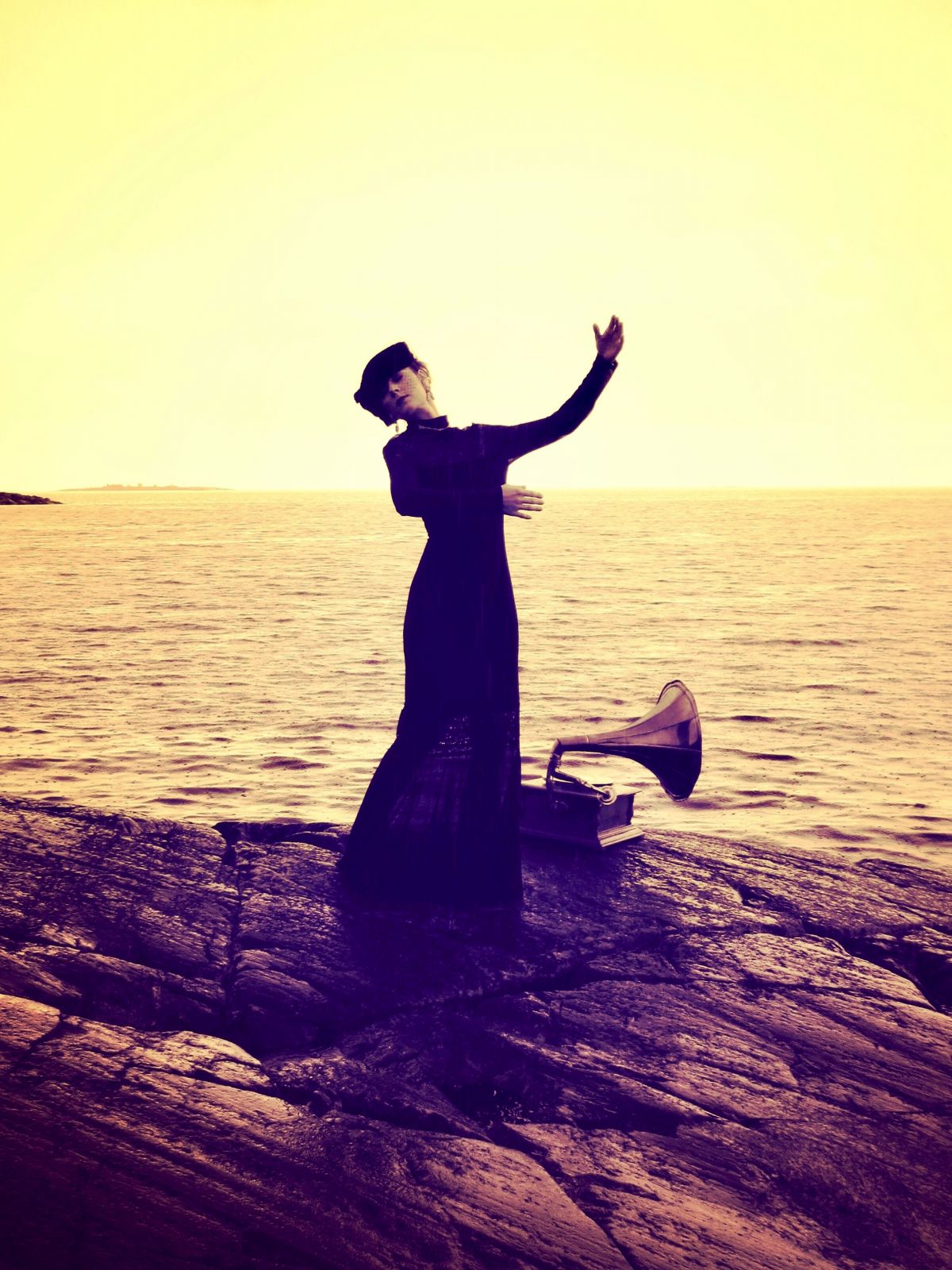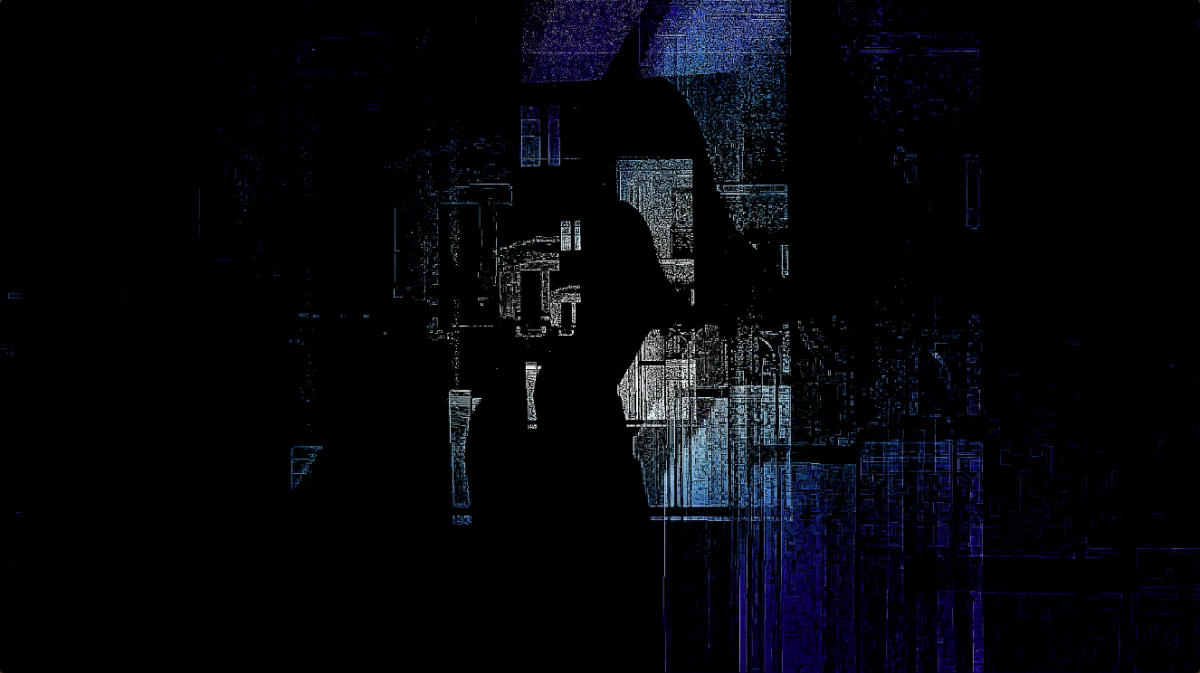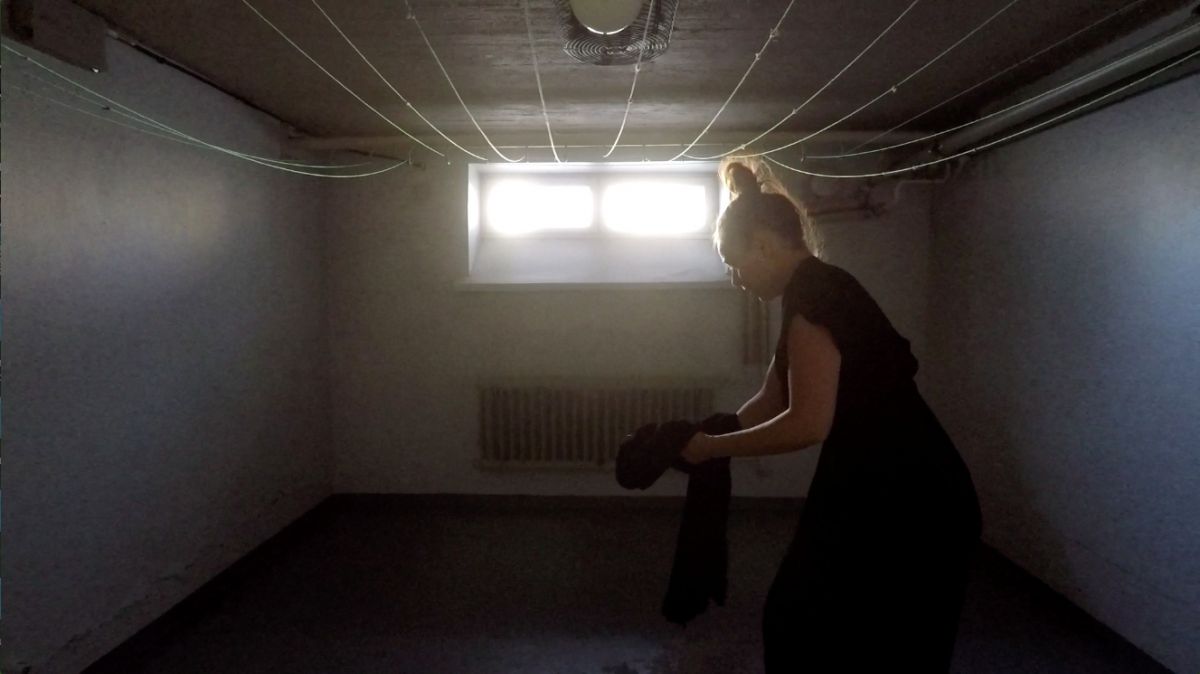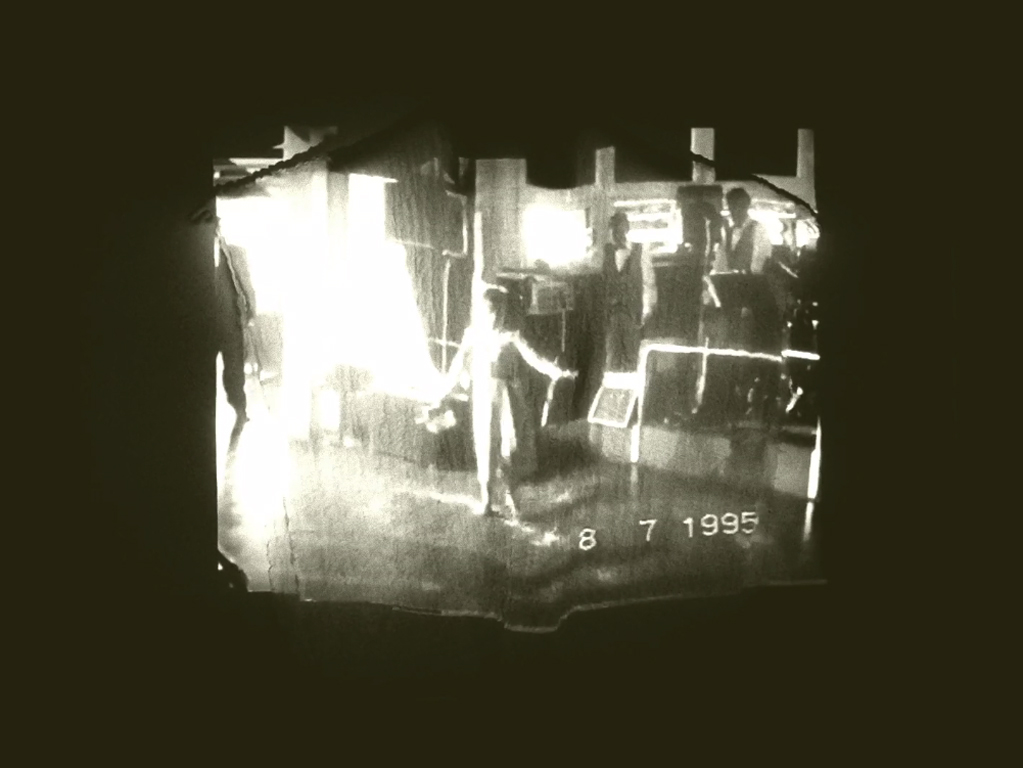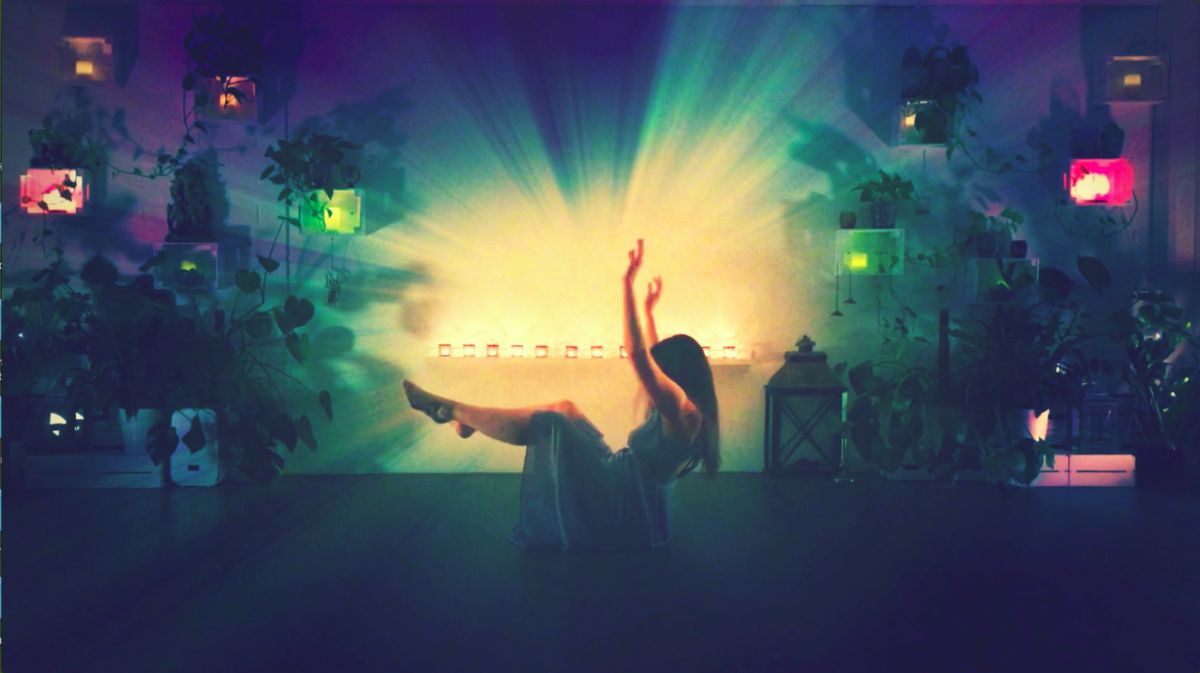Miten päädyitte yhteistyöhön?
Yhteistyö alkoi kun meidät molemmat kutsuttiin kirjallisuutta ja tanssia yhdistäneeseen Runovaara-työpajaan. Risto Oikarisen, Johanna Paason, Laura Lindstedtin ja Martti-Tapio Kuuskosken järjestämässä työpajassa toteutettiin tunnin mittainen kirjallisuutta ja tanssia yhdistänyt esitys Kajaanin runoviikoille 2013. Kyseinen esitys vieraili myöhemmin myös Runokuu-festivaalilla. Mukana työpajassa ja esityksessä oli Valtterin [Raekallio] ja mun lisäksi tanssija-koreografi Auri Ahola ja kirjailijoista Laura Lindstedt, Henriikka Tavi ja Jaakko Yli-Juonikas. Valtterihan on myöhemmin tehnyt teokset myös Oneironin ja Neuromaanin pohjalta. Myöhemmin syksyllä Valtteri kutsui mut katsomaan ensimmäistä Mihin valo katoaa -teostaan, josta pidin kovasti. Vaikutuksen tekivät tanssin lisäksi silloin itselleni uusi esityksen muoto, immersiivisyys, ja teoksen monitaiteisuus. Annoin hänelle alkuvuodesta 2014 ilmestyneen Tekniikan maailmat -kokoelmani, jonka luettuaan Valtteri ehdotti yhteistyötä. Tästä syntyi ensimmäinen varsinainen yhteistyöteos, immersiivinen ja paikkasidonnainen Edustaja, jota esitettiin loka-marraskuussa 2014 Jätkäsaaren Bunkkerissa.
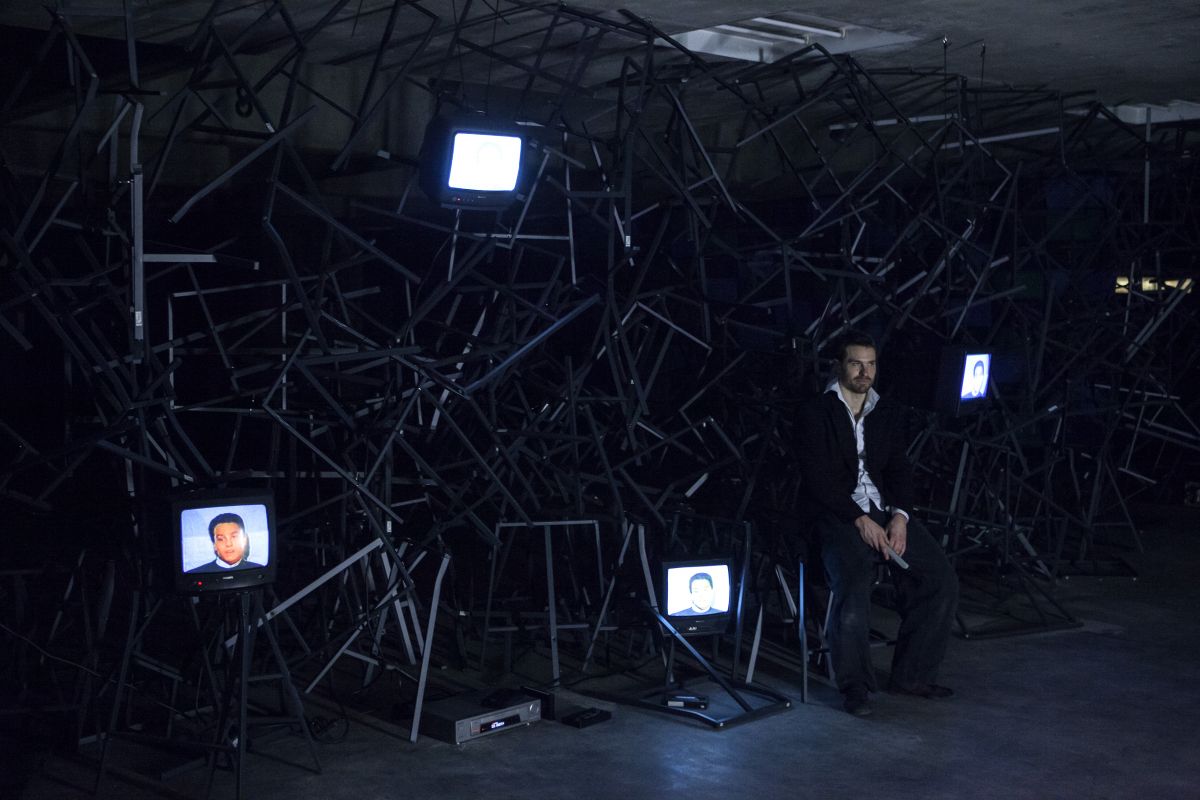
Valtteri Raekallio, Edustaja/The Representative. Kuva: Marko Mäkinen.
Eri teoksissa runokokoelmiesi ja esityksen välinen suhde on ollut erilainen, Novelleja unohdetuista huoneista -teoksen Raekallion runojesi pohjalta rakentamasta runokollaasista Yleisö-runokokoelman sisältävään Yleisö-teokseen, jossa esiinnyt ja luet lähes kaikki runot itse. Haluatko kertoa näistä prosesseista vähän lisää? Miten viimeisimmän, Yleisö-teoksen tekoprosessi eteni?
Yhteistyömme tapa on ollut vaihteleva. Kaksi isointa esitystä Edustaja ja Yleisö on kasattu runokirjojeni ympärille – Edustaja pohjautuu Tekniikan maailmoihin ja Yleisö Yleisö-runokirjaan, niin, että lähtökohtina ovat olleet runokokoelmassa olevat runot ja tapani esittää niitä. Valtteri on sitten rakentanut runojen päälle kokonaistaideteoksen, joka sisältää eri tavoin esittämäni runouden lisäksi tanssia, installaatioita ja esitystaidetta. Olen osallistunut vaihtelevasti myös näiden muiden elementtien ideointiin, mutta Valtterilla on ollut kokonaisuudesta lopullinen taiteellinen vastuu ja yleensä pitkällä olevia näkemyksiä jo ennen keskusteluja. Edustaja ja Yleisö siis rakentuivat mun runoille ja omille tavoilleni esittää niitä, ja olin niissä vieläpä eräänlaisessa pääroolissa, mutta kaikkien näiden yhteisteostemme taiteellinen vastaava on Valtteri ja ne ovat myös hänen tanssiryhmänsä Raekallio Corp.in teoksia.
”Edustajassa esiintyessäni ja tätä yleisösuhdetta eri muodoissaan ja eri puolilta kokiessani tulin yhä vakuuttuneemmaksi, että ”yleisöys” on eräs aikaamme läpileikkaavimmin kuvaavista teemoista.”
Vuoden 2014 Edustajaa alettiin tekemään Tekniikan maailmat -kokoelman pohjalta ja alun perin niin, että Valtteri innostui siihen kuuluvan, yhdeksänosaisen Tekniikan maailmat -runon esityksestä. Tätä pitkää runoa ja sen eri versioita olin esittänyt ennen varsinaisen kirjan ilmestymistä lukuisissa eri yhteyksissä. Olin myös käyttänyt sen versioita black mödernism -ryhmän esityksissä (itseni lisäksi ryhmään kuuluvat Matti Kangaskoski ja Tuomas Timonen). Lopulta Edustajaan tulivat mukaan tavalla tai toisella yhtä lukuunottamatta kaikki Tekniikan maailmat –kirjan runot. Kirjan setelirunoista tehtiin installaatio tai lavaste yhteen kohtauksista. Kirjoitin sadalle 20 euron setelille kirjassa olleita setelirunoja ja näitä käytettiin kohtauksessa, jossa Auri Aholan esittämä hahmo tanssii peilicatwalkilla, jonka yläpuolella roikkuu näitä seteleitä. Toisessa kohtauksessa Valtterin esittämä hahmo liimaili alastomana runoseteleitä kehoonsa keskellä yleisöä. Kokoelman Edustaja-sarjasta tehtiin myös videonauhoite esityksen prologina olleelle bussimatkalle. Varsinaisessa esityksessä miltei jokaisessa kohtauksessa oli runoutta jollain tapaa mun esittämänäni.
Täydenkuun tanssit -festivaalille tehdyssä Novelleja unohdetuista huoneista -teoksessa Valtteri teki kollaasin ääninauhoitteista, joille olin lukenut Tekniikan maailmat -kokoelman Edustaja-sarjaa, ja käytti tätä ääninauhakollaasia teoksensa yhtenä elementtinä.
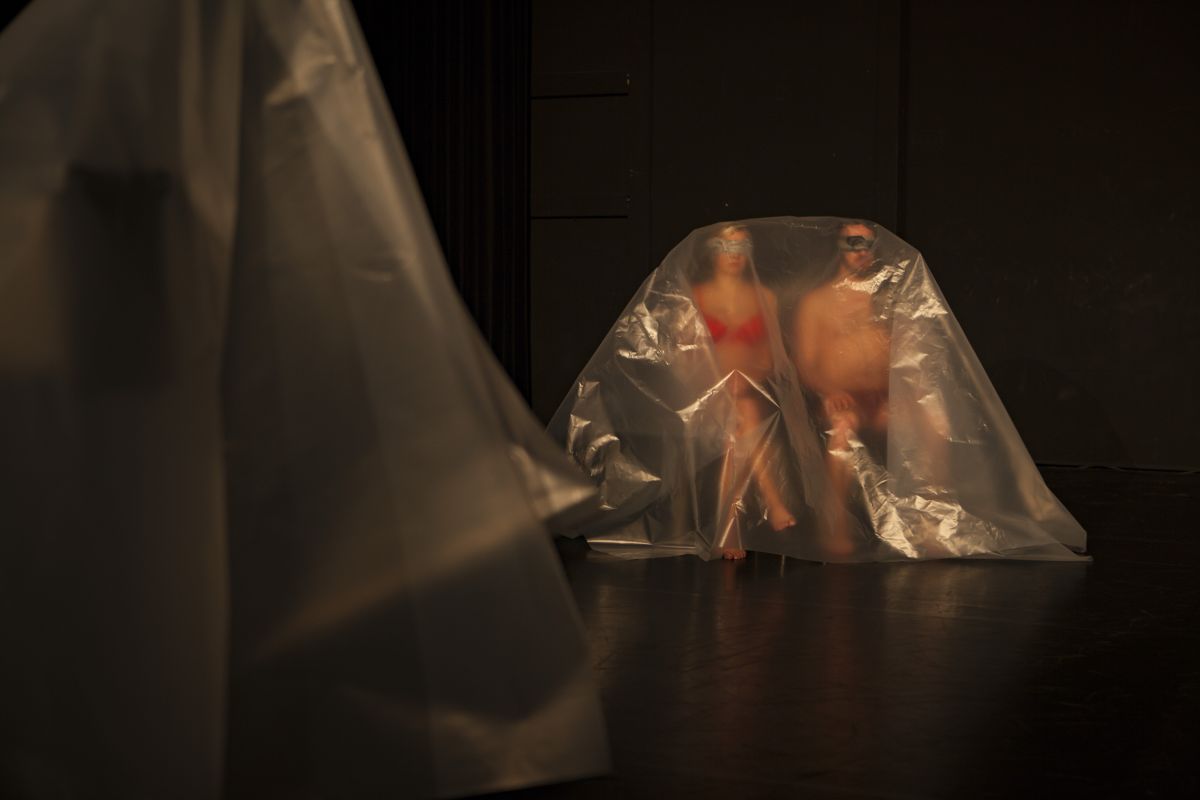
Esitys – A Performance. Kuva: Jukka Huitila.
Oulun Valve-salissa ja Hurjaruuthin näyttämöllä Helsingissä esitetty Esitys – A Performance on jälleen yhteistyömme kannalta mielenkiintoinen teos. Olin kertonut Edustajan esityskauden aikana Valtterille, että aion kirjoittaa seuraavan kirjani yleisöydestä. Yleisöyden idea oli ollut olemassa jo ennen Edustaja-esitystä, mutta tuossa esityksessä Valtteri käsitteli yleisösuhdetta monella tapaa, jopa siinä määrin, että yleisöstä tuli mun mielestä yksi esityksen hahmoista. Edustajassa esiintyessäni ja tätä yleisösuhdetta eri muodoissaan ja eri puolilta kokiessani tulin yhä vakuuttuneemmaksi, että ”yleisöys” on eräs aikaamme läpileikkaavimmin kuvaavista teemoista.
”Olin Tekniikan maailmoja kirjoittaessani valjastanut esitystyöskentelyn kokonaisvaltaiseksi osaksi kirjoitustyötäni.”
Aloin siinä vaiheessa kirjoittaa ensimmäisiä versioita Yleisö-kirjan runoista. Niitä päätyi myös black mödernismin järjestämän kirjallisen esitystaiteen festivaalin Universumin kiertueen esityksiin touko-kesäkuussa 2015. Järjestimme black mödernismin kanssa neljän illan mittaisen festivaalin Universumin kiertueen teatteri Universumilla Helsingissä, jonne olimme kutsuneet toistakymmentä kirjallisuuslähtöistä esitystaidetta tekevää ryhmää esiintymään. Teimme myös itse iltoihin neljä esitystä.
Olin Tekniikan maailmoja kirjoittaessani valjastanut esitystyöskentelyn kokonaisvaltaiseksi osaksi kirjoitustyötäni. Olen tehnyt tätä jo runoilijan urani alkuvaiheista asti, mutta Teknarin kohdalla erityisesti kirjan pitkä nimiruno rakentui hyvin voimakkaasti erilaisten esitysten avulla kirjoittaen.
Käytin yhdessä Universum-esityksessä Yleisö-kirjan runojen ensimmäisiä versioita. Valtteri kuuli siellä niitä ja ehdotti, että kirjoittaisin runoja hänen uuteen viritteillä olevaan teokseensa, jota hän aikoi kasata erään tanssiduettonsa päälle. Samana syksynä Valtteri pyysi mua katsomaan duettoa Harjoitus rakkaudesta, jossa tanssivat mulle Edustajasta jo tuttu Mirva Mäkinen ja Eero Vesterinen. Menin katsomaan esitystä ja aloin kirjoittamaan sen perusteella tekstiä, josta tuli eräänlainen metataso duetolle.
Lopullisessa teoksessa Esitys – A Performance Valtterin hahmo toimi eräänlaisena näyttämölle tuotuna ohjaajana tai taiteilijana, joka ohjailee duettoa ja samalla lausuu kirjoittamaani yleisösuhdetta käsittelevää runosarjaa, ja samalla pyrkii esiintymisellään mallintamaan mun runoihin rakentamia lausuntatapoja. Tuohon esitykseen kirjoitettua noin kymmenen liuskan runosarjaa ei ole koskaan julkaistu missään. Se on eräänlaista yleisösuhteen läpikäymistä ja monia pätkiä tai aihioita siitä on hyödynnetty Yleisö-kirjan Yleisö-runosarjassa, sekä kokoelman avaavassa 2 min sitten joku toinen minä -runossa.
Yleisö-kirjasta tehtävälle Yleisö-esitykselle oli siis olemassa vahva pohja ja sovimme yhteistyöstä jo ennen kirjan ilmestymistä. Kirja tuli ulos syksyllä 2017 ja esitys sai ensi-iltansa syksyllä 2018. Aloimme treenata sitä keväällä 2018 niin, että luin kirjan kaikki runot nauhalle ja Valtteri alkoi niiden pohjalta miettiä kohtauksia ja visuaalista ilmettä. Keskustelimme näistä ja varsinaisesta esityspaikasta silloin tällöin.
”Turbiineilla täytetty kylmä teollisuuskiinteistö ei ole sama asia kuin tanssisali.”
Keväällä alkoi täsmentyä myös se, että teos tehdään Tekniikan museoon. Valtteri selvitteli paria muutakin vaihtoehtoa, mutta Tekniikan museo tuntui lopulta parhaalta. Valtteri oli aloittanut työskentelyn ja koreografioinnin tanssijoiden kanssa mun tekstin ja sen herättämien mielikuvien avulla. Meillä oli loppukesästä ja syksyllä kaksi residenssijaksoa tanssijoiden Annamari Keskisen ja Eero Vesterisen kanssa, joiden aikana Valtterin hahmottelemien kohtausten tanssia ja lausuntaa yhdistettiin, ajoitettiin, sovitettiin, harjoiteltiin ja paranneltiin. Kohtaukset pohjautuivat kokoelman avaavan seitsemänosaisen runon 2 min sitten joku toinen minä osiin. Alkoi käydä selväksi, että tähän teokseen mahtuu noin puolet kokoelman runoista. Kohtausrunojen lisäksi siihen otettiin kymmenkunta Yleisö-sarjan tekstiä ja Rajauksia-sarjan itseohjautuvien autojen eettisistä ongelmista kertovat runot, joista tehtiin nauhoite bussimatkaprologia varten. Setelirunoja tuli tähän teokseen vähemmän. Setelirunoista Sarjanumerokristus ja Meidän virallinen kielemme tehtiin ideani pohjalta jättimäiset lippumaiset installaatiot yhteen kohtaukseen. Meidän virallinen kielemme -setelirunon tekstiä käytettiin myös nauhoitteena pitkässä kohtauksessa jossa Yleisö-kilvin varustetut mellakkapoliisit kuljettavat yleisön Vanhankaupungin kosken sillan yli.
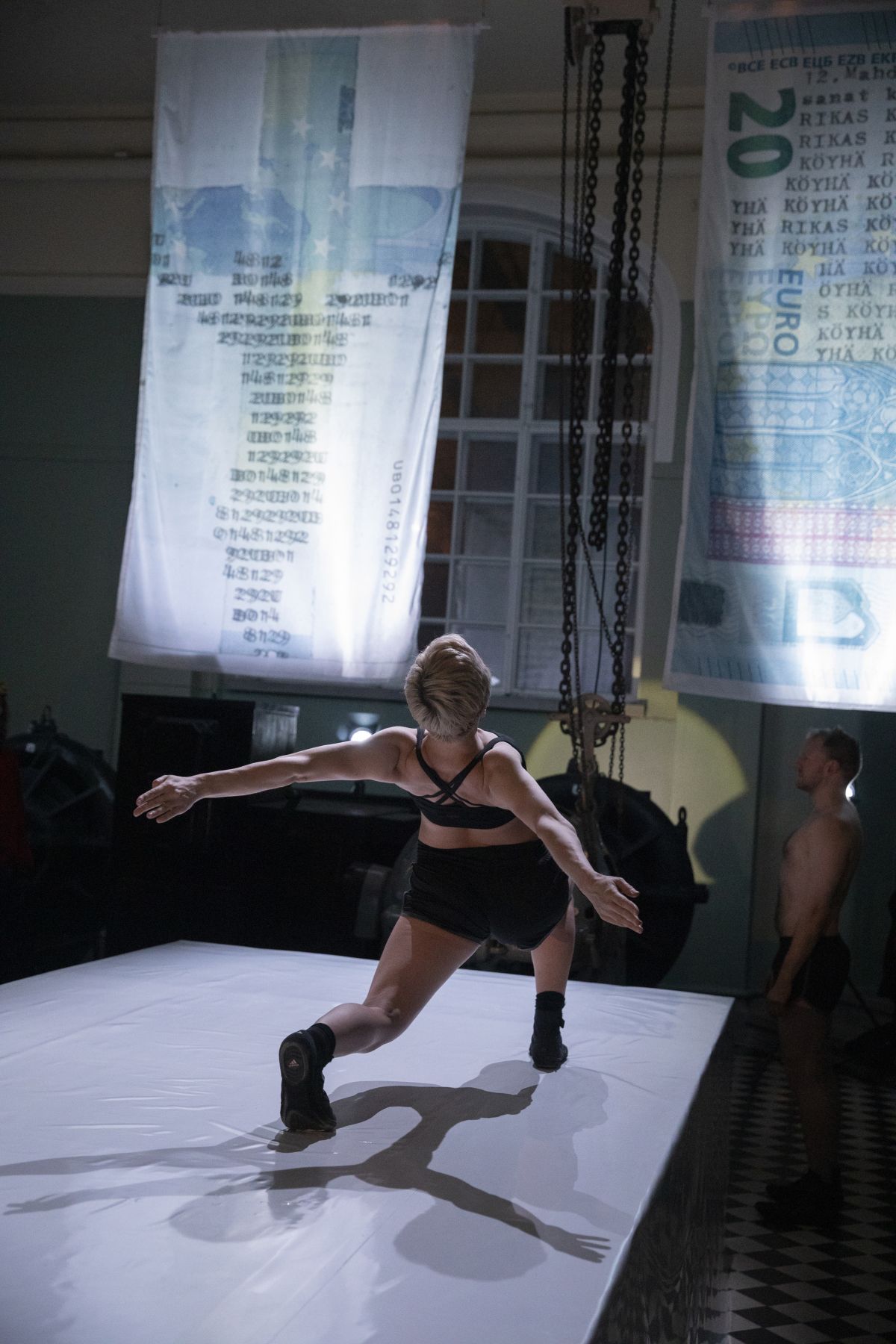
Yleisö, Annamari Keskinen ja Eero Vesterinen. Kuva: Stefan Bremer.
Tämän lisäksi Valtteri oli jatkuvasti tehnyt työtä myös lavastajan ja valosuunnittelijan kanssa, jotka ovat näissä paikkasidonnaisissa ja immersiivisissä teoksissa hyvin suuressa roolissa. Näyttämöön verrattuna tilaa on paljon ja siinä myös liikutaan. Tämän lisäksi näyttämöteokset ovat usein paikoissa joissa infraa on valmiiksi. Paikkasidonnaisessa esityksessä kaikki pitää rakentaa.
Residenssijaksojen jälkeen aloimme työt tanssistudiossa. Pääsimme varsinaiseen esityslokaatioon pari viikkoa ennen ensi-iltaa. Siellä tilanne oli tietyllä tavalla täysin uusi. Varsinainen esitystila toi monenlaisia pieniä muutoksia tanssisaleissa harjoiteltuihin kohtauksiin. Turbiineilla täytetty kylmä teollisuuskiinteistö ei ole sama asia kuin tanssisali. Huomattiin, että jotkut ajatukset eivät toimi tilassa käytännössä ja sitten nopeassa tahdissa kehitettiin korvaavia ideoita.
Mikä on oma suhteesi tanssiin taiteenlajina?
Olen vuosien varrella seuraillut tanssia jonkun verran, kuten muitakin taiteita, mutta en voi sanoa olevani nykytanssin tuntija. Laji kyllä kiinnostaa ja ymmärrys sen suhteen on tietenkin jonkun verran kasvanut yhteistöiden myötä.
Ensimmäinen yhteisteoksenne on jo vuodelta 2014. Ovatko yhteistyöt vaikuttaneet tapaasi ajatella runoutta, omaa ja/tai muiden?
Olen ollut sillä tavalla hieman poikkeava toimija suomalaisessa nykyrunokentässä, että olen ollut aina kiinnostunut sekä uusia muotoja etsivistä kirjoittamisen tavoista, että runouden esityksellisyydestä. Useinhan nämä suuntaukset ajatellaan toisistaan poikkeavina. Historiallisessa avantgardessa nämä eivät kuitenkaan ole ollenkaan toisiaan poissulkevia asioita, jos ajattelee vaikka Dadaa ja Cabaret Voltairea, jossa kokeellinen tai avantgardistinen runous tuotiin juurikin esitysmuodossa esiin. Ja onhan meilläkin esimerkiksi tekijöitä, jotka yhdistävät kokeelliset muodot visuaalisen konkretismin ja konseptualismin perinteen äänirunouteen niin, että teksti toimii sekä paperilla että esityksessä, kuten Cia Rinteen teoksissa.
Esityksessä kirjoittamisen kannalta hyvää on se, että se kriisiyttää kirjoittamisen.
Omassa työssäni nämä ovat kulkeneet rinnakkain. Olen etsinyt uusia muotoja painettuun muotoon ja esitykseen. Kuluvalla vuosikymmenellä olen käyttänyt yhä aktiivisemmin esitystä myös kirjoittamisen laboratoriona. Esityksessä kirjoittamisen kannalta hyvää on se, että se kriisiyttää kirjoittamisen. Ensinnäkin esitys muodostaa kuolettavan välideadlinen kun pitää mennä lavalle tekstin kanssa, eikä teksti saisi olla paskaa, jolloin tekstille saattaa tapahtua lyhyessä ajassa ihmeitä. Toinen hyvä puoli tällaisessa metodissa on, että esitettäessä tajuaa toisella tavalla sen mikä toimii ja mikä ei. Tämä johtuu siitä, että kyseessä on toinen media, ja kirjoitettua tekstiä tulee katsottua uusin silmin. Valmiita vastauksia ei yleensä esittäessä tule, mutta dynaamisia suuntia ja vaihtoehtoja, joihin jatkaa, usein löytyy.
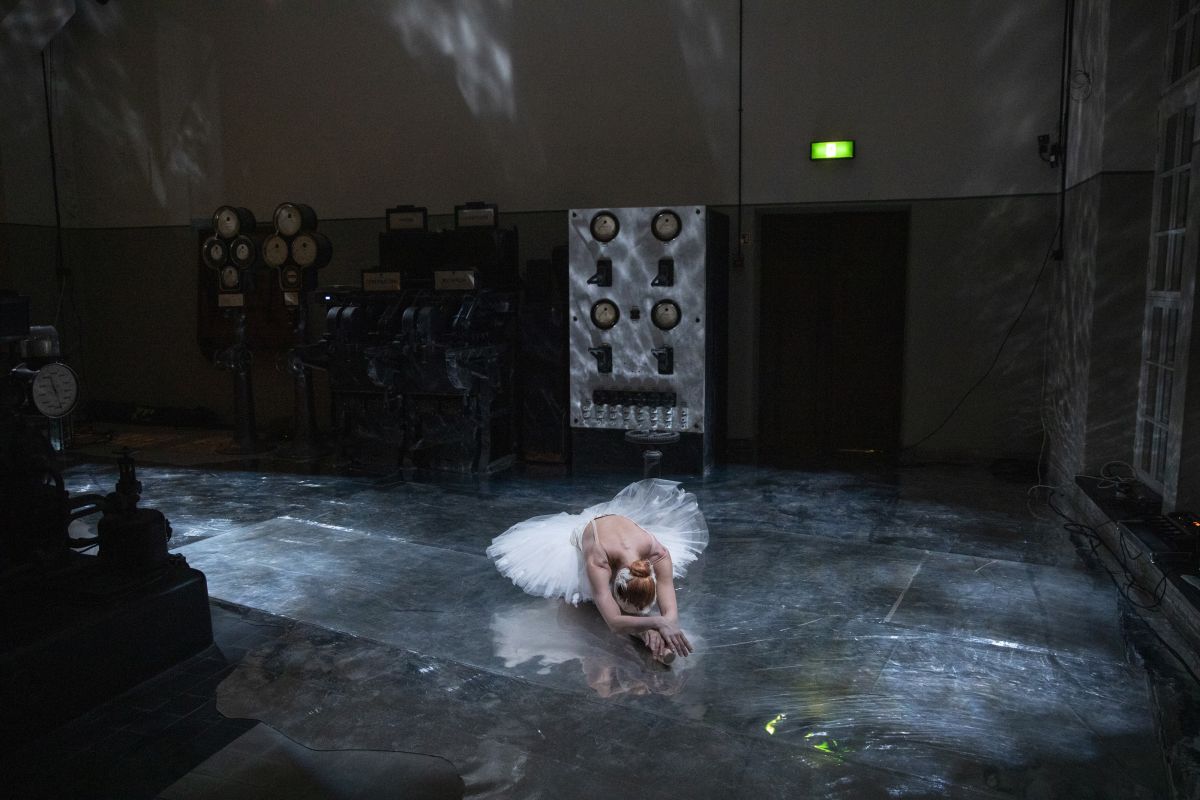
Yleisö, Minna Tervamäki. Kuva: Stefan Bremer.
Ongelmallista esittäminen on kirjoittamisen kannalta sikäli, että esitys on erilainen media kuin vaikkapa kirja. Esitys on kestollinen. Ääneksi muuttunutta tekstiä on auditiivisessa tilassa aina tietyn verran ja sitten se korvautuu uudella. Tekstiä lukiessa voi aina palata taaksepäin, esitys taas menee jatkuvasti eteenpäin. Ja vanhan on vaara unohtua. Tällöin esitystä varten kirjoittaja saattaa käyttää sellaisia keinoja, jotka kirjaan siirrettyinä eivät välttämättä toimi. Yksi tällainen vaaran paikka on erilaisten toistokeinojen ylenmääräinen käyttö. Popmusiikki näyttää miten toisteisen kertosäkeen avulla palautetaan vahva yhteys kuulijaan aina uudelleen. Kertsejä hoilottaa yhdessä koko yleisö. Silloin epäselvä mumina muuttuu kirkkaaksi yhteiseksi lauluksi ja mikäpäs sen hienompaa. Runoa esitykseen kirjoitettaessa onkin helposti vaarana, että kirjoittajan tekee mieli jäädä lavalla toistelemaan itseään, jotta kaikki muistaisivat jatkuvasti missä mennään. Tiedän tämän hyvin, koska käytän toistokeinoja kirjoittaessani niin paljon. Toisteisuuteen kirjoittamisessani on toki vahvoja kirjallisia syitä, mutta itselleni kirjan ja estradin mediumien välillä tasapainotteleminen näyttäytyy usein toiston määrän kanssa tasapainoilemisena.
”Runo on tekemisissä kielen ja tanssi liikkeen perusteiden kanssa. Tämän lisäksi muodonmuutosten maailma on molemmissa läsnä.
Olen tehnyt myös monitaiteisia juttuja koko runoilijan urani ajan ja olen sitä mieltä, että toisten taiteiden kanssa toimiminen ja niiden yhteydessä kirjoittaminen opettaa myös kirjoittamisesta paljon. Usein uudessa kontekstissa tajuaa omaa tekemistään uudesta kulmasta.
Mikä mielestäsi yhdistää runoutta ja tanssia?
Analogista niissä on tietty ytimiin meno. Runo on tekemisissä kielen ja tanssi liikkeen perusteiden kanssa. Tämän lisäksi muodonmuutosten maailma on molemmissa läsnä. Tuntuu siltä, että tämä muodonmuutoksellisuus on molempien ytimessä. Kuitenkin ne ovat perustavalla tavalla toisistaan eroavia – esitetty tanssi on usein liikettä ilman puhetta ja runous puhetta ilman liikettä. Kenties näistä syistä niiden päällekkäisyys on mahdollista ja kiinnostavaa.
Tanssia sisältävät esitykset koostuvat monenlaisista osista itse tanssin lisäksi, ympäristöstä, yleisöstä, puvustuksesta, äänimaailmasta. Miten nämä resonoivat teoksissanne runoutesi kanssa?
Tätä kaikkea on usein rakentamassa monta ihmistä, taiteellinen vastaava on kuitenkin Valtteri. Paikkasidonnaisissa ja immersiivisissä teoksissa ympäristö näyttelee erittäin suurta roolia. Se ei ole vain esityspaikka, vaan esitystä luetaan sen kautta. Jos runoutta käytetään niin massiivisesti kuin esim. Edustajassa tai Yleisössä niin ympäristön olisi hyvä jollain tavalla kommunikoida myös runojen kanssa. Sama pätee kaikkiin muihin elementteihin. Parasta tulosta ei kuitenkaan saada mielestäni sillä, että eri elementit pelkästään kuvittaisivat esimerkiksi teoksessa kuullun runouden sisältöjä. Mielenkiintoisinta on jos teksti ja muut elementit tangeeraavat, mutta eivät ole täysin yksi yhteen. Tämä lisää parhaimmillaan esitystilanteen jännitteisyyttä. Yleisö-teos oli hyvä esimerkki tästä. Siinä oli monta erilaista kuvaa päällekkäin, jopa niin että kuulin valitusta että välillä kaikkea oli liikaa. Tämä informaation hetkittäinen ylitarjonta näyttämökuvassa on mun mielestä vain positiivista. Se pitää yleisön varpaillaan ja kiinnostuneena.
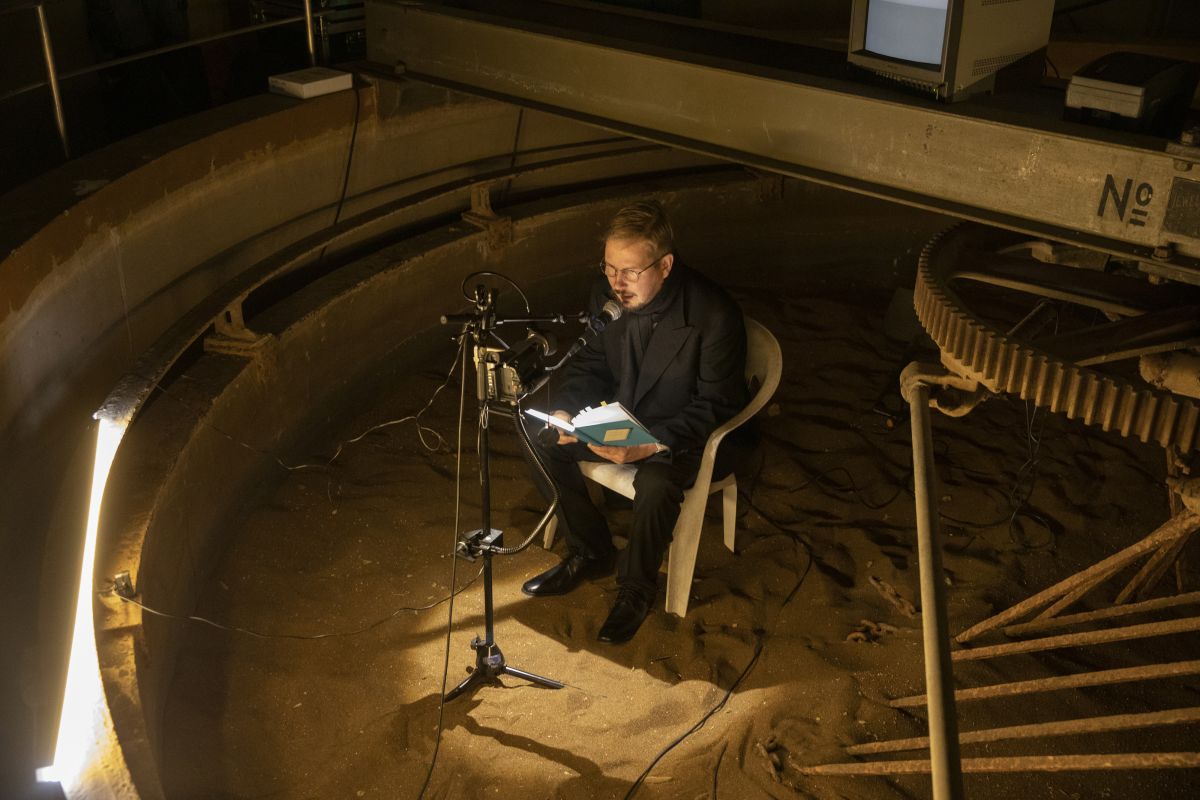
Yleisö, Eino Santanen. Kuva: Stefan Bremer.
Suomalaisessa runoudessa tuntuu tapahtuvan juuri nyt erityisen paljon eri taiteenlajeja yhdistävän runouden saralla. Onko jotain teoksia (runoutta muihin yhdistäviä tai miksei kokonaan toistenkin taiteenlajien teoksia), jotka ovat tuntuneet erityisen vaikuttavilta viime aikoina?
Olen ehtinyt seurata valitettavan vähän yhtään mitään. Kaikki aikani tuntuu menevän nykyisin lukemiseen ja kirjoittamiseen. Olen tekstin kanssa tekemisissä jatkuvasti.
Toimit myös Kriittisen korkeakoulun Kirjoittajakoulun toisena vastaavana opettajana. Onko jotain kiinnostavia uusia kehityssuuntia runouden ja muiden taiteiden risteyskohdissa, joita olisi syytä seurata?
Kriittisen koulu on nimensä mukaisesti Kirjoittajakoulu ja siellä opetellaan ja opetetaan ensi sijaisesti kirjoittamista. Meillä toki tutustutaan esimerkiksi digitaaliseen kirjallisuuteen ja kirjallisuutta ja muita taiteita risteyttäviin teoksiin, mutta pääpaino on kirjoitetussa kirjallisuudessa. Koulussa on kuitenkin usein oppilaita, jotka yhdistävät kirjoittamiseensa erityisesti visuaalista aineistoa. Visuaalisuus on tietenkin kirjallisuudessa muutenkin paljon vahvemmin läsnä kuin joskus aiemmin. Visuaalisia keinoja käytetään yhä enemmän esimerkiksi romaanikirjallisuuden parissa.






